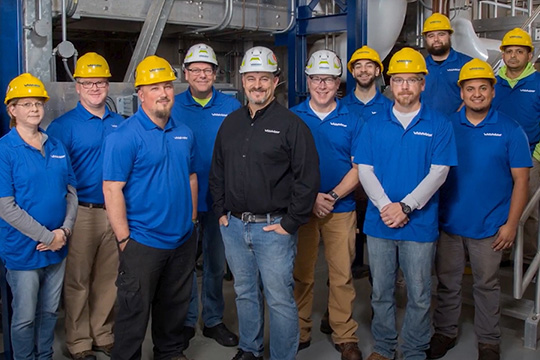In service-based industries, it’s tempting to do everything you can to please a potential customer. Share your expertise. Provide solutions upfront. Go above and beyond to show your value. After all, isn't that how you win their trust?
The problem is this approach can backfire. Instead of building trust, you risk devaluing your expertise and eroding your profitability. You end up giving away your intellectual property for free and training the prospect to take it without committing to anything in return. This not only impacts margins but also creates a dynamic where you’re constantly chasing RFPs rather than partnering with your clients to develop win-win opportunities.
At Next Level, we call this trap “free consulting.” And it’s a behavioral challenge that many businesses—particularly in service-based industries—struggle to overcome. RH White Construction Company, a 101-year-old general contractor in Auburn, MA, learned this lesson firsthand. By working with Next Level, they made the critical shift from over-serving and over-promising prospects to creating mutual value, protecting their intellectual property, and fostering healthier, more balanced client relationships.
Answering Questions: A Common Challenge in Service-Based Businesses
Like many service organizations, RH White’s team found themselves falling into the “free consulting” trap. As Jim McCarthy, CEO of RH White, explained, they often jumped straight into problem-solving mode without asking deeper questions or fully understanding the prospect’s true needs.
“We were so used to giving answers and being expected to provide solutions,” Jim recalls. “But we weren’t asking the right questions. We were jumping to conclusions and providing answers without fully diagnosing the root issue.”
This well-intentioned but shortsighted behavior led to RH White giving away their intellectual property—their ideas, expertise, and problem-solving abilities—without ensuring that it benefited both the client and the company.
The result? They were over-delivering for prospects who hadn’t yet committed to being customers, often at the expense of their own best interest.
The Shift from Free Consulting to Equal Business Stature
Jim and his team partnered with Next Level to change the way they approached sales and customer relationships. One of the most transformative lessons they learned was the Sandler principle of “no free consulting.”
This mindset shift is rooted in the belief that your expertise has value—and that value needs to be protected. By giving away solutions upfront, you’re doing a disservice to your business and the client. Why? Because you’re failing to create a dynamic of mutual respect and equal business stature.
At RH White, this concept resonated deeply. Jim explains:
“Many times, we weren’t doing the best thing for either party. Next Level helped us understand that we needed to prioritize creating value for both the customer and ourselves.”
Instead of diving headfirst into solving the prospect’s problem, the RH White team adopted a more measured, consultative approach. They began asking thoughtful questions to uncover the root issues. They worked to ensure alignment on goals and expectations before presenting any solutions.
By doing so, they shifted the focus from transactional interactions to collaborative partnerships. They stopped over-serving and started building relationships grounded in trust through sales calls based on discovery and mutual benefit.
Adopting a “no free consulting” approach does more than protect your intellectual property. It also delivers tangible business benefits, including:
1. Preserving Margins
When you stop giving away your expertise for free, you ensure that your services and solutions are appropriately valued. This safeguards your profitability and prevents the erosion of your margins.
2. Reinforcing Equal Business Stature
By approaching customer relationships as a partnership, you position yourself as an equal—not as a vendor chasing approval. This dynamic builds mutual respect and lays the foundation for a stronger, more balanced relationship.
3. Focusing on the Right Customers
Free consulting often attracts the wrong type of customers: those who want to extract value without investing in a partnership. By adopting a disciplined approach, you weed out prospects who aren’t a fit and focus your energy on clients who recognize and value your expertise.
Learning to Ask Better Questions, Rather Than Answering Them
One of the key skills RH White developed through their work with Next Level was the ability to ask more purposeful questions.
“Meaningful conversations start with meaningful questions,” Jim says. “We learned to slow down and truly identify the root issues. That was a major shift for us. Instead of jumping straight to answers, we now ask thoughtful questions, listen more, and ensure we’re addressing the real problems—not just the surface-level ones.”
This approach not only helped RH White avoid free consulting but also improved the overall quality of their client interactions. The team became more strategic in their conversations, more aligned with their clients, and more effective at delivering solutions that created mutual value.
Building Stronger Partnerships
Today, RH White views Next Level not just as a training provider but as a strategic partner. The lessons they’ve learned have had a lasting impact on their business.
As Jim reflects:
“Next Level helped us see that we weren’t just investing in sales training. We were investing in a long-term solution to improve our processes and skills. That mindset shift—from giving answers to creating value—has made all the difference.”
If you find yourself stuck in the cycle of over-delivering or giving away solutions for free, consider how adopting a “no free consulting” approach could transform your business. It’s not just about protecting your intellectual property. It’s about building a more sustainable, successful future for your team and your customers.
Ready to learn more about how Next Level can help your team create value and preserve profitability? Contact us today.






